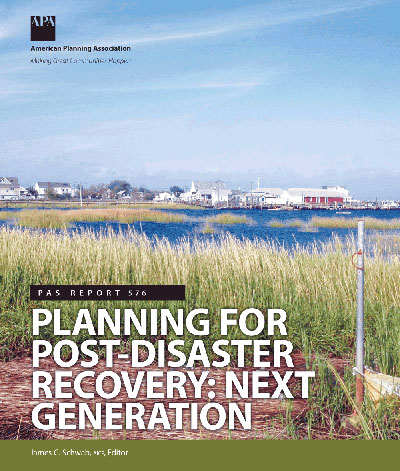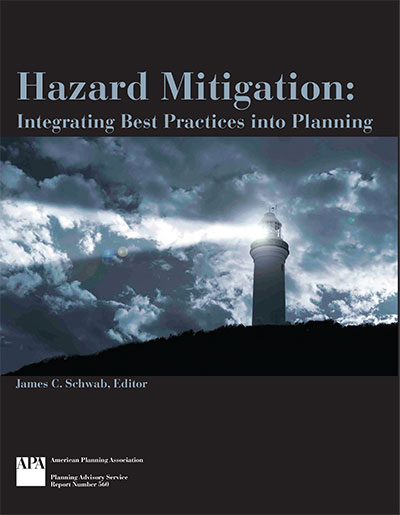Disaster Recovery Resources

LA Wildfires
As the impacts of the LA wildfires continue to unfold, our thoughts are with the Southern California community. APA is committed to assisting and providing future wildfire disaster recovery planning resources for when communities start rebuilding efforts.
If you are interested in providing immediate assistance, please consider donating to the Los Angeles Regional Food Bank, and for more information and resources related to the LA wildfires, visit the APA California website.
APA has long engaged with FEMA, APA chapters, and other partners to be ready to assist when disaster relief and recovery work begins.
Planners are invited to use the APA research, education, and publication resources below to assist with post-disaster recovery work and future hazard mitigation. Check out the Climate Change Resource page for additional information.
List of Resources
Post-Disaster Recovery
Post-Disaster Recovery Briefing Papers
The project briefing papers may be used alone or alongside Planning for Post-Disaster Recovery: Next Generation. These succinct, downloadable PDFs are ideal handouts for meetings with officials and the general public.
- Public Engagement in Recovery Planning
- Measuring Success in Recovery
- Planning Resilient Infrastructure
- Affordable Housing
- Economic Recovery for Manufacturing
- Flood Insurance and Design Requirements
- Planning for Recovery Management
- Adopt a Pre-Event Recovery Ordinance
- Financial Recovery
- Green Infrastructure and Post-Disaster Recovery
- Hazard Mitigation in Disaster Recovery
- Visioning
Planning for Post-Disaster Recovery: Next Generation
PAS Report 576
This updated PAS Report lays out a no-nonsense explanation of the benefits — and limitations — of planning for unpredictable events. Available to all as a free download.
Hazard Mitigation: Integrating Best Practices into Planning
PAs Report 560
This PAS Report outlines how communities can integrate hazard mitigation priorities throughout the local planning process. Available to all as a free download.
Hurricane and Flooding
APA has made these issues of Zoning Practice available for free:
Zoning for Coastal Flood Resilience | June 2018
Accounting for Flood Hazards in the Subdivision Approval Process | March 2016
Putting Sustainable Zoning into Practice | July 2013
Promoting Flood Resiliency Through the Regulatory Process | April 2012
Safe Growth Audits | October 2009
Subdivision Design and Flood Hazard Areas
PAS Report 584
This report will help end the cycle of build-damage-rebuild. It offers communities sound guidance to bring subdivision design into line with the best of floodplain planning. The report was produced in partnership with the Association of State Floodplain Managers, with funding from FEMA.
Resilience Roundtable Podcast Series
In the APA Podcast series Resilience Roundtable, host Rich Roths, AICP, talks with planners and allied professionals who make resilience their mission, even in the face of devastating natural hazards. Rich is a senior hazard planner for Burton Planning Service of Columbus, Ohio. Previously, he worked for the Federal Emergency Management Agency (FEMA), where he was in charge of coordinating all mitigation planning activities for the six states in Region V. Rich is also a member of APA's Hazard Mitigation and Disaster Recovery Planning Division.
Episode 1: John Henneberger

The first episode features John Henneberger, an expert on low-income housing issues, a 2014 MacArthur Fellow, and the co-director of Texas Housers, a nonprofit that advocates for equitable disaster recovery policy and practices. John describes Hurricane Harvey's specific toll on Houston and the surrounding area and how cyclical these disasters can seem, as many of the neighborhoods his organization works in have identical characteristics to what they saw in New Orleans's Lower Ninth Ward after Hurricane Katrina. Again and again, throughout the discussion, John argues that good planning practice and equity are inextricably linked, and giving disaster survivors a sense of agency is one of the most important things planners can do for affected individuals.
Episode 2: Kim Mickelson, AICP
In the second episode of Resilience Roundtable, Kim Mickelson, AICP, joins host Rich Roths, AICP, to discuss Hurricane Harvey from her perspective as a City of Houston Planning Department attorney. The storm hit during her first week on the job, and it compelled city officials to approve a new hazard-mitigation action plan in March 2018. Kim talks about how having their third 500-year — or greater — storm in 18 months made them take a second look at their floodplain regulations, including elevation requirements for new construction and their infrastructure design standards. She reviews the more challenging, Houston-specific aspects of the cleanup process and how she immediately thought to engage the services of APA's Community Planning Assistance Team once the storm had passed.
Check out the resources Kim mentions in this episode:
- APA's PAS Report Planning for Post-Disaster Recovery and Reconstruction (listeners can also find the updated edition here)
Episode 3: Lt. Emily Ussery and Jack Heide, AICP

In the third episode of Resilience Roundtable, host Rich Roths, AICP, talks with community planner Jack Heide, AICP CFM, and Lt. Emily Ussery, PhD, about the impact of Hurricanes Irma and Maria — two back-to-back Category 5 storms — on the US Virgin Islands in 2017. The two discuss their unique reasons for working in the region, how combining their expertise led to a more comprehensive recovery effort, and the lessons they took away from their first disaster response and recovery experience.

Emily is an epidemiologist with the Physical Activity and Health Branch of the National Center for Chronic Disease Prevention and Health Promotion at the Centers for Disease Control and Prevention (CDC). She is also a lieutenant with the US Public Health Service. Jack works as a planner for the Federal Emergency Management Agency (FEMA) in Region II, which covers New Jersey, New York, the Commonwealth of Puerto Rico, and the US Virgin Islands.
Episode 4: Pete Parkinson, AICP

Pete Parkinson's planning career has spanned not only decades but also various California counties. As a result, he's familiar with a wide range of hazards. In the fourth episode of the APA Podcast series Resilience Roundtable, he and host Rich Roths, AICP, discuss many of them, including earthquakes, floods, landslides, and wildfires. Pete, unfortunately, has a very personal experience dealing with the latter, as he and his family lost their home in October 2017 when multiple fires tore through Sonoma County, as well as Lake, Napa, Mendocino, and Solano counties. His story focuses on the Tubbs Fire, which began in Calistoga but spread into Santa Rosa, even jumping Highway 101 in the process. It destroyed the Coffey Park neighborhood and, ultimately, the Santa Rosa mobile home park where Pete's mother-in-law lived. Pete is now working as a consultant on the new multifamily development at the site of the former mobile home park. The veteran planner ends his account by sharing the life-saving lessons he learned during and after the experience.
Establishing a Federal Flood Risk Management Standard
APA's Hazard Mitigation Center Manager Jim Schwab, FAICP, speaks with Association of State Floodplain Managers Executive Director Chad Berginnis about the establishment of a federal standard for flood risk management and how that affects the hazards field.
"The Cost Comes Before The Benefits"
Former Dutch Ambassador Renee Jones-Bos discusses how the Netherlands has dealt with issues of flooding and offers a unique perspective on how American planners can find value in the Dutch approach to dealing with water management.
NOAA Supporting Resiliency
Dr. Kathryn Sullivan, Under Secretary of Commerce for Oceans and Atmosphere and National Oceanic and Atmospheric Administration (NOAA) discusses how NOAA is meeting the need to build resilient communities and businesses.
Wildfire
APA has worked with several partners on how to mitigate the risk and impact of damage related to wildfires. Below are several publications that focus specifically on wildfire risk reduction and recovery.
Multihazard Planning Framework for Communities in the Wildland-Urban Interface | APA report
Living on the Edge: Get to Know Your WUI | APA blog
The Wildland-Urban Interface | PAS QuickNotes 69
Zoning and Land Use Tools in the Wildland-Urban Interface (Zoning Practice, September 2018)
Limiting Wildfire Risk Through Land-Use Controls | Zoning Practice, May 2012
Models for Mitigating Wildfire Hazards Through Zoning | (Zoning Practice, March 2005
Planning the Wildland-Urban Interface
PAS Report 594
This report offers planners an in-depth introduction to the WUI and wildfire basics, covering challenges, trends, and historical context along with the latest wildfire science. It then moves to solutions, providing a holistic planning framework and practical guidance on how to address WUI and wildfire challenges in plans, policies, and regulations.
Planning for Wildfires
PAS Report 529/530
People continue to build in wildfire-prone areas, posing challenges for governments and planners. This report explores how knowledge of wildfire risks can be incorporated into comprehensive planning and identifies best practices for development in at-risk areas. Digital PAS Reports are free to APA members and may be purchased by nonmembers.
Planning for Wildfires
Firewise Communities: An Interview with Michelle Steinberg







